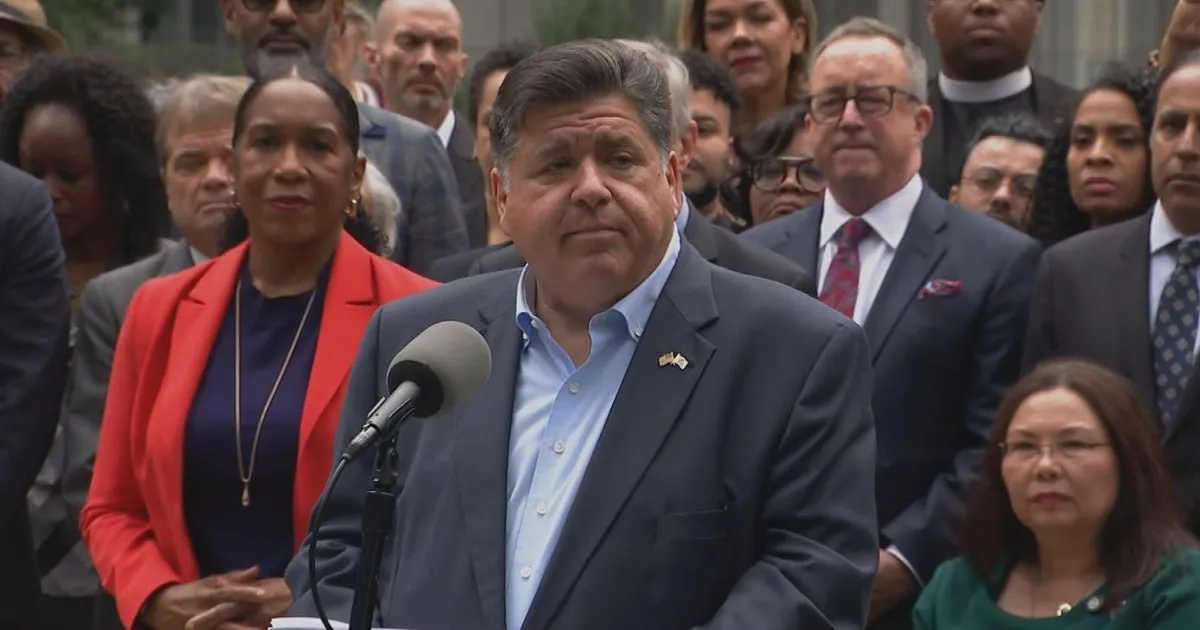
In a recent news conference, Illinois Governor JB Pritzker expressed grave concerns over reports indicating that President Donald Trump is planning to send armed military personnel to the streets of Chicago. During his remarks, Pritzker emphasized the distinction between the actual crisis facing the city and the manufactured narratives surrounding it. He called upon citizens of Illinois and the nation to heed the alarm he is raising regarding this unprecedented situation.
Governor Pritzker highlighted that the intention of sending military troops to Chicago represents a significant overreach by President Trump, which he argues contradicts the principles established by the nation's founders. "What President Trump is doing is unprecedented and unwarranted," Pritzker stated, labeling the action as illegal, unconstitutional, and un-American. He pointed out that neither he nor Chicago's mayor had been consulted prior to these plans being publicized, revealing that they learned about the military deployment through a news report in The Washington Post.
The governor questioned the rationale behind such a drastic measure, suggesting that it is not about ensuring public safety but rather a tactic to intimidate political opponents in what he described as a blue city and state. Pritzker stressed that Chicago is not experiencing an emergency that necessitates military intervention, stating, "There is no insurrection." He noted that, like many major American cities, Chicago faces crime challenges, yet its local police and leaders are actively working to address these issues.
Governor Pritzker reassured the public that significant progress is being made in improving public safety in Chicago. He cited statistics showing a 32% reduction in murders compared to the previous year and a significant decline in shootings, robberies, and burglaries. "We have invested historic amounts into community violence intervention programs," he explained, emphasizing the importance of listening to community needs in creating effective crime prevention strategies.
In his speech, Pritzker drew attention to the broader political context, noting that many cities with higher homicide rates are governed by Republicans. "If Donald Trump was genuinely committed to fighting crime in cities like Chicago, he would not be cutting over $800 million in public safety and crime prevention grants nationally," he argued. The governor pointed out that such cuts undermine local law enforcement efforts and community support systems designed to enhance safety.
Governor Pritzker urged journalists to report truthfully on the situation, stating, “This is not a time to pretend there are two sides to this story.” He expressed concern that Trump's actions represent a dangerous power grab, one that, if occurring in another country, would be condemned globally. The governor highlighted the unity among Chicago's leaders in opposing the military deployment, emphasizing that this coalition spans various sectors, including business, faith, and law enforcement.
Pritzker firmly rejected Trump's invitation to protect Chicago, stating, “You are neither wanted here nor needed here.” He stressed the importance of respecting the sovereignty of Illinois and the decisions made by its elected representatives. He expressed his commitment to leveraging all available means to protect the rights of Illinois residents, including potential legal action against the Trump administration.
In closing, the governor encouraged peaceful protests in response to the military deployment, urging citizens to remember that members of the National Guard are part of local communities. He warned against using them as political props, highlighting the seriousness of deploying military personnel in civilian settings. Pritzker concluded with a message of resilience, invoking Dr. Martin Luther King Jr.'s belief that "the arc of the moral universe is long, but it bends toward justice," and emphasized the need for active engagement to ensure that justice prevails.